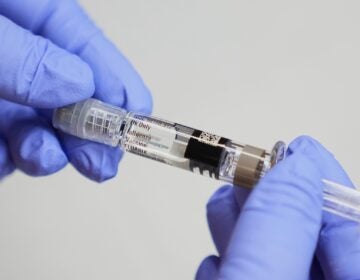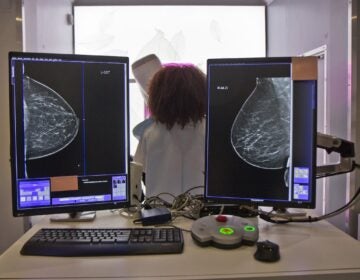Restoring mussel populations and improving water quality in northern Delaware [video]
The Partnership for the Delaware Estuary is attempting to restore mussel populations and improve water quality in Delaware.
Adorned in beige fishing waders, members of the Partnership for the Delaware Estuary walked waist deep into a lake holding baskets of hundreds of baby mussels.
The group of environmentalists carefully placed the baskets of live shellfish into the water with the hope they will flourish and grow into healthy adults.
Bellevue Lake is one of many local bodies of water being used to restore fresh water mussel populations. The lake is located in Wilmington on land owned by drinking water supplier SUEZ Delaware Operations.
On Wednesday, PDE members carried 1,200 baby mussels to the lake from its Philadelphia hatchery as part of a 10-year effort to restore mussel populations and improve water quality.
“We’re trying to promote filter-feeding shellfish, because they help filter the water, which improves water quality, removes pollutants, transforms those pollutants into less polluting forms and helps remove particulates,” said Danielle Kreeger, senior science director for PDE.
“The second goal is freshwater mussels are the most imperiled of all plants and animals in North America, so there’s a strong interest in conserving the biodiversity we have left, which is the greatest biodiversity of anywhere in the world, in the United States.”
Bellevue Lake was the first body of water SUEZ’s predecessor used in the 1930s to supply drinking water in the area. The company no longer uses it to supply drinking water, but the mussels that will grow there will be placed in the White and Red Clay Creeks, which they currently use to supply drinking water to 100,000 New Castle County residents.
“They’re taking an approach that’s very environmentally sustainable, which is one of the major goals of SUEZ—to be environmentally sustainable, and protecting, and preserving and improving the quality of the surface waters we use to make drinking water for about 100,000 people in Delaware,” said Tom Hubbard, public affairs manager for SUEZ.
“This notion of using these amazing creatures, if we can restore their populations upstream from our water treatment plant, the water’s going to be so much cleaner by the time it gets to our treatment plant, that potentially we could reduce the amount of treatment we have to do, it would reduce our carbon footprint, because we wouldn’t have to use as much electricity to treat the water, and it could possibly cut costs and help customers in that way.”
As part of its mussel restoration program, PDE propagated about 100,000 baby mussels this year, which are being sent to various ponds in the area. The group is examining various ponds in Delaware and Pennsylvania to determine the best habitats for the baby mussels that will allow them to grow as big and fast as possible.
Once the mussels grow, the larger ones will move from the baskets in the ponds to mussel silos in streams, where they will be protected under the water.
Each mussel filters about 10 gallons of water every day, digesting good and bad particles and releasing the bad particles to the bottom of the water, Kreeger said.
“So, if you think about your Brita filter in your kitchen, filtering out all those particles, purifying the water, a fresh water mussel will be like a Brita filter you don’t have to change every 10 or 12 days, saving a lot of money on water treatment,” she said.
Hubbard said while water supply is in abundance, ensuring good quality water is the most challenging.
“Most of what we deal with is sediment that comes downstream when there are major rain events, upstream in Pennsylvania there’s a lot of erosion, and these creatures can filter that out,” he said.
“There used to be hundreds of thousands of them in White Clay Creek. They’ve almost disappeared because of development and sedimentation, so if we can bring those populations back and they can naturally filter the water, what a great thing for the planet and for the water we put out as drinking water.”
WHYY is your source for fact-based, in-depth journalism and information. As a nonprofit organization, we rely on financial support from readers like you. Please give today.





